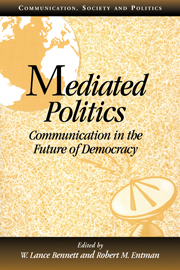Book contents
- Frontmatter
- Contents
- List of Figures
- List of Tables
- Contributors
- Preface
- Acknowledgments
- 1 Mediated Politics: An Introduction
- Part 1 Democracy and the Public Sphere
- Part 2 Citizens, Consumers, and Media in Transition
- Part 3 Mediated Political Information and Public Opinion
- Part 4 Mediated Campaigns
- Part 5 Citizens: Present and Future
- 19 Citizen Discourse and Political Participation: A Survey
- 20 Adapting Political News to the Needs of Twenty-First Century Americans
- 21 National Identities and the Future of Democracy
- 22 Communication in the Future of Democracy: A Conclusion
- Index
20 - Adapting Political News to the Needs of Twenty-First Century Americans
Published online by Cambridge University Press: 05 June 2012
- Frontmatter
- Contents
- List of Figures
- List of Tables
- Contributors
- Preface
- Acknowledgments
- 1 Mediated Politics: An Introduction
- Part 1 Democracy and the Public Sphere
- Part 2 Citizens, Consumers, and Media in Transition
- Part 3 Mediated Political Information and Public Opinion
- Part 4 Mediated Campaigns
- Part 5 Citizens: Present and Future
- 19 Citizen Discourse and Political Participation: A Survey
- 20 Adapting Political News to the Needs of Twenty-First Century Americans
- 21 National Identities and the Future of Democracy
- 22 Communication in the Future of Democracy: A Conclusion
- Index
Summary
It is axiomatic in a democracy that citizens must be interested in politics and must be well informed. When it seems like interest in politics is declining and knowledge levels are plunging, red warning flags go up. They have been up for quite a while in the final decades of the twentieth century. Observers are particularly concerned because the decline in interest and factual knowledge about politics has been steepest among the youngest age group – sometimes referred to as “Generation X.” The direction that political life in the United States will take early in the twenty-first century hinges on the attitudes and behaviors of this generation. Political scientist Michael Delli Carpini (1989, pp. 11–12) is right when he says that “there is no more fundamental transfer of power, and therefore no more fundamental potential for change, than that which occurs between generations. This is so because, unlike any other type of change, it is inevitable, it is allinclusive … entire populations are replaced every century … In the light of personnel replacement of this magnitude, the transfer of power that occurs in elections, or through assassinations, or even in revolutions, pales.”
This is why it is important to examine the mind-set of the nation's young adults to assess how safe the heritage of democracy is likely to be in their care. It is equally essential to undertake this examination with an open mind.Major changes in the social, economic, political, and cultural environment in the twentieth century may have produced major changes in the conceptions of the nature of citizenship in a democracy, especially when accompanied by major changes in political news dissemination and consumption patterns.
- Type
- Chapter
- Information
- Mediated PoliticsCommunication in the Future of Democracy, pp. 433 - 452Publisher: Cambridge University PressPrint publication year: 2000
- 7
- Cited by

